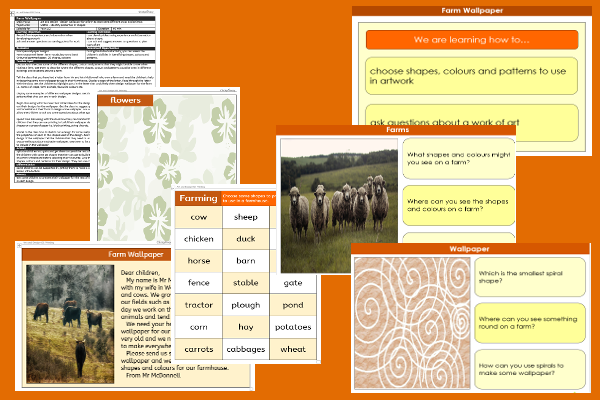Lesson Five – Farm Wallpaper

This art and design teaching pack for Key Stage One gets the children to explain and model how to select the matching design for a wallpaper pattern to display in a farmhouse representing some different farm crops and animals.
The class can practise using their experience and knowledge to select and use sets of matching shapes when printing a pattern on a specific topic or theme.
Download this teaching pack including a lesson plan, classroom activities and an interactive presentation to explain and model how to select the matching design for a wallpaper pattern to display in a farmhouse representing some different farm crops and animals
Activities in this teaching pack include display posters to identify some of the special shapes, colours and patterns that can be used on different wallpapers, a shared reading text to identify and suggest how to design and print wallpaper on a specific theme and a vocabulary word bank to select and design wallpaper that is suitable for use in a farmhouse.
The interactive presentation can be used to explore how to select and design a wallpaper pattern for a farmhouse to represent different crops and animals.
This lesson is part of an art and design scheme of work to get the children to practise and demonstrate different techniques when printing a range of shapes and patterns that can reflect themes and ideas related to farming. There are teaching activities for shared learning, differentiated worksheets to support independent learning and interactive presentations to introduce concepts and key skills.
-

Garden Numbers
Identify and model some of the different calculation techniques that can be used when adding pairs of single digit numbers
-

Summer Stories
Practise composing and presenting narrative stories with familiar settings to illustrate the events and experiences that could happen during the summer
-

Fraction Numbers
Investigate how to use concrete equipment, diagrams and calculations to identify and record the matching fractions of different numbers
-

Family Holiday Lists
Explore how to compile sentences punctuated using commas to list some of the special things that families can use, complete and experience on a holiday
